Book contents
- Frontmatter
- Contents
- Preface
- General Introduction
- 1 ALBERT THE GREAT: Questions on Book X of the Ethics
- 2 BONAVENTURE: Conscience and Synderesis
- 3 GILES OF ROME: On the Rule of Princes (selections)
- 4 PETER OF AUVERGNE: Commentary and Questions on Book III of Aristotle's Politics (selections)
- 5 HENRY OF GHENT: Is It Rational for Someone without Hope of a Future Life to Choose to Die for the Commonwealth?
- 6 GODFREY OF FONTAINES: Does a Human Being Following the Dictates of Natural Reason Have to Judge that He Ought to Love God More than Himself?
- 7 JAMES OF VITERBO: Does a Human Being Have a Greater Natural Love for God than for Himself, or Vice Versa?
- 8 GODFREY OF FONTAINES: Reply to James of Viterbo on Love of God and Self
- 9 HENRY OF GHENT: Is a Subject Bound to Obey a Statute When It Is Not Evident that It Promotes the Common Utility?
- 10 GODFREY OF FONTAINES: Are Subjects Bound to Pay a Tax When the Need for It Is Not Evident?
- 11 JAMES OF VITERBO: Is It Better to Be Ruled by the Best Man than by the Best Laws?
- 12 JOHN OF NAPLES: Should a Christian King Use Unbelievers to Defend His Kingdom?
- 13 WILLIAM OF OCKHAM: Using and Enjoying
- 14 AUGUSTINE OF ANCONA: Summa on Ecclesiastical Power (selections)
- 15 WILLIAM OF OCKHAM: Is an Errant Individual Bound to Recant at the Rebuke of a Superior?
- 16 JEAN BURIDAN: Questions on Book X of the Ethics
- 17 JOHN WYCLIF: On Civil Lordship (selections)
- Index
3 - GILES OF ROME: On the Rule of Princes (selections)
Published online by Cambridge University Press: 05 June 2012
- Frontmatter
- Contents
- Preface
- General Introduction
- 1 ALBERT THE GREAT: Questions on Book X of the Ethics
- 2 BONAVENTURE: Conscience and Synderesis
- 3 GILES OF ROME: On the Rule of Princes (selections)
- 4 PETER OF AUVERGNE: Commentary and Questions on Book III of Aristotle's Politics (selections)
- 5 HENRY OF GHENT: Is It Rational for Someone without Hope of a Future Life to Choose to Die for the Commonwealth?
- 6 GODFREY OF FONTAINES: Does a Human Being Following the Dictates of Natural Reason Have to Judge that He Ought to Love God More than Himself?
- 7 JAMES OF VITERBO: Does a Human Being Have a Greater Natural Love for God than for Himself, or Vice Versa?
- 8 GODFREY OF FONTAINES: Reply to James of Viterbo on Love of God and Self
- 9 HENRY OF GHENT: Is a Subject Bound to Obey a Statute When It Is Not Evident that It Promotes the Common Utility?
- 10 GODFREY OF FONTAINES: Are Subjects Bound to Pay a Tax When the Need for It Is Not Evident?
- 11 JAMES OF VITERBO: Is It Better to Be Ruled by the Best Man than by the Best Laws?
- 12 JOHN OF NAPLES: Should a Christian King Use Unbelievers to Defend His Kingdom?
- 13 WILLIAM OF OCKHAM: Using and Enjoying
- 14 AUGUSTINE OF ANCONA: Summa on Ecclesiastical Power (selections)
- 15 WILLIAM OF OCKHAM: Is an Errant Individual Bound to Recant at the Rebuke of a Superior?
- 16 JEAN BURIDAN: Questions on Book X of the Ethics
- 17 JOHN WYCLIF: On Civil Lordship (selections)
- Index
Summary
Introduction
Giles of Rome (Aegidius Romanus, Egidius Colonna) was born in Rome around 1243–47. He joined the Hermits of St. Augustine at the age of fourteen. Sent to Paris in 1260, he completed his liberal arts studies in 1266 and entered the faculty of theology. He was studying there when Thomas Aquinas returned for his second period as regent master (1269–72). As a young theologian, Giles was soon caught up in disputes within the university over the teaching of Aristotle in the Faculty of Arts. In 1277 Stephen Tempier, the bishop of Paris, condemned as erroneous 219 propositions in theology and natural philosophy, fifty-one of which were drawn from Giles's commentary on the Sentences of Peter Lombard. Withdrawing to Bayeux and thence to Italy, Giles nevertheless continued to work on a series of commentaries on Aristotle's philosophical texts. These included the Physics, Metaphysics, De anima, and On Rhetoric. In 1285 Giles was rehabilitated, returning to Paris as the Augustinians' first regent master in theology, and in 1287 his writings were made the official teaching of the Augustinian order. Giles was elected General of the order in 1292 and was made Archbishop of Bourges in 1295. Besides On the Rule of Princes, Giles's other major political work was a sweeping defense of papal plenitude of power, On Ecclesiastical Power (trans. R. W. Dyson, Woodbridge, 1986), which he composed in 1302 for Pope Boniface VIII. Giles died in 1316.
- Type
- Chapter
- Information
- The Cambridge Translations of Medieval Philosophical Texts , pp. 200 - 215Publisher: Cambridge University PressPrint publication year: 2000

